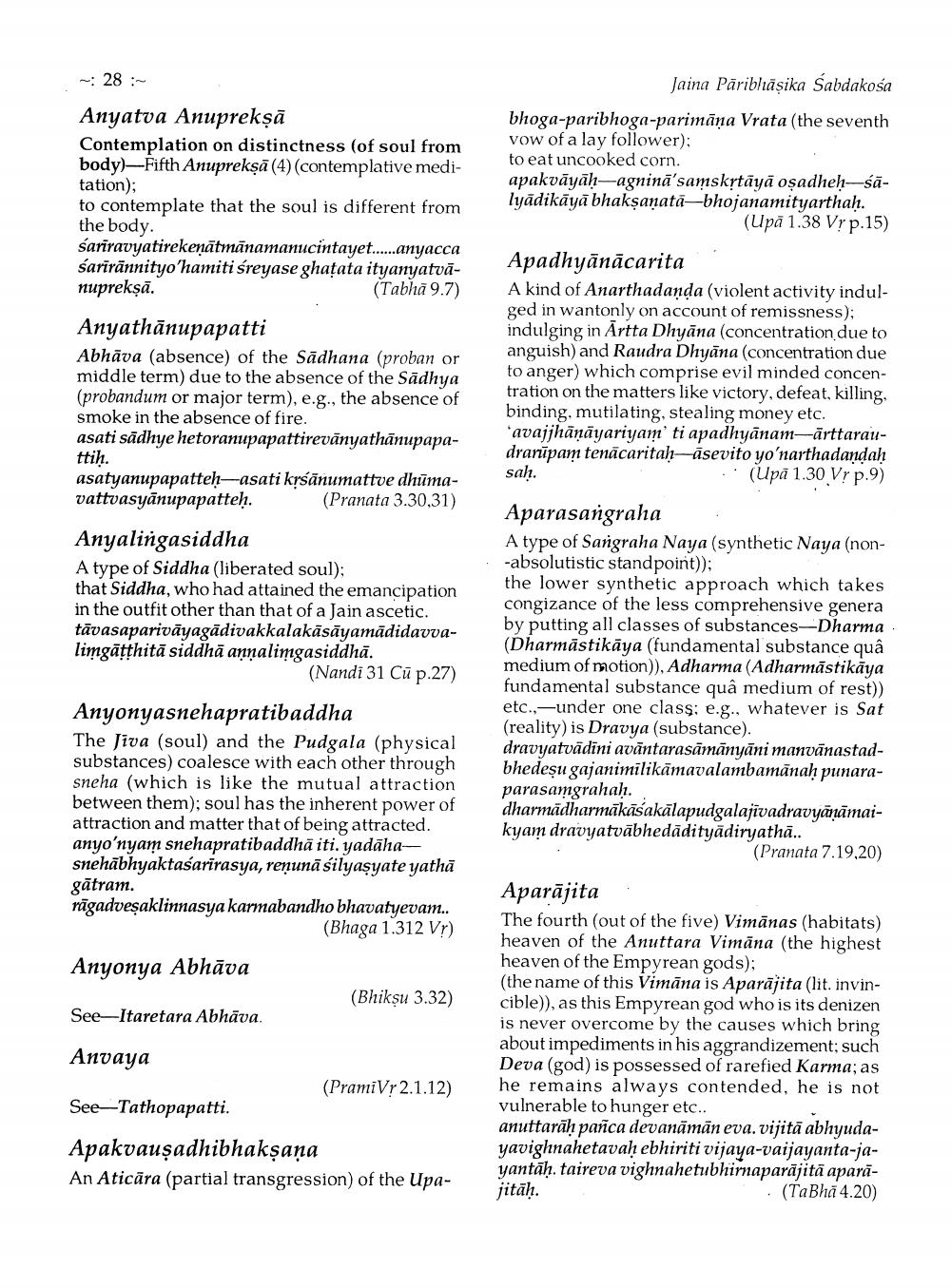________________
-
28 :
Anyatva Anupreksā Contemplation on distinctness (of soul from body)-Fifth Anupreksā (4) (contemplative meditation); to contemplate that the soul is different from the body. sariravyatirekenātmānamanucintayet......anyacca śarīrānnityo'hamiti śreyase ghatata ityanyatvānuprekṣā.
(Tabhā 9.7)
Anyathānupapatti Abhāva (absence) of the Sadhana (proban or middle term) due to the absence of the Sadhya (probandum or major term), e.g., the absence of smoke in the absence of fire. asati sādhye hetoranupapattirevānyathānupapattih. asatyanupapatteh-asati krśānumattve dhūmavattvasyānupapatteh. (Pranata 3.30,31)
Jaina Pāriblāșika Sabdakosa bhoga-paribhoga-parimāņa Vrata (the seventh vow of a lay follower); to eat uncooked corn. apakvāyāh-agninā'samskytāyā oşadheh-salyädikāyā bhakşanatā—bhojanamityarthah.
(Upā 1.38 Vr p.15) Apadhyānācarita A kind of Anarthadanda (violent activity indulged in wantonly on account of remissness); indulging in Artta Dhyāna (concentration due to anguish) and Raudra Dhyāna (concentration due to anger) which comprise evil minded concentration on the matters like victory, defeat, killing, binding, mutilating, stealing money etc. 'avajihänāyariyam' ti apadhyānam-ärttaraudrarüpam tenācaritah-āsevito yo'narthadandah sah.
. (Upă 1.30 V, p.9) Aparasangraha A type of Sangraha Naya (synthetic Naya (non-absolutistic standpoint)); the lower synthetic approach which takes congizance of the less comprehensive genera by putting all classes of substances-Dharma (Dharmästikāya (fundamental substance quâ medium of motion)), Adharma (Adharmästikāya fundamental substance quâ medium of rest)) etc., -under one class; e.g., whatever is Sat (reality) is Dravya (substance). dravyatvādini avāntarasāmānyāni manvānastadbhedesu gajanimilikāmavalambamānah punaraparasamgrahah. dharmādharmākāsakālapudgalajīvadravyānāmaikyam dravyatvābhedādityadiryathā..
(Pranata 7.19,20)
Anyalingasiddha A type of Siddha (liberated soul); that Siddha, who had attained the emancipation in the outfit other than that of a Jain ascetic. tāvasaparivāyagādivakkalakāsāyamādidavvalimgātthitā siddhā annalimgasiddhā.
(Nandi 31 Cū p.27)
Anyonyasnehapratibaddha The Jiva (soul) and the Pudgala (physical substances) coalesce with each other through sneha (which is like the mutual attraction between them); soul has the inherent power of attraction and matter that of being attracted. anyo'nyam snehapratibaddhä iti. yadāhasnehābhyaktaśarīrasya, reņunā silyaşyate yathā gātram. rāgadveşaklinnasya karmabandho bhavatyevam..
(Bhaga 1.312 Vr)
Anyonya Abhāva
(Bhikṣu 3.32)
See-Itaretara Abhāva.
Aparājita The fourth (out of the five) Vimānas (habitats) heaven of the Anuttara Vimāna (the highest heaven of the Empyrean gods); (the name of this Vimāna is Aparajita (lit. invincible)), as this Empyrean god who is its denizen is never overcome by the causes which bring about impediments in his aggrandizement; such Deva (god) is possessed of rarefied Karma; as he remains always contended, he is not vulnerable to hunger etc.. anuttarah panca devanāmān eva. vijitā abhyudayavighnahetavaḥ ebhiriti vijaya-vaijayanta-jayantah. taireva vighnahetubhirnaparäjitā aparājitāḥ.
· (TaBhā 4.20)
Anvaya
(PramiVr 2.1.12)
See-Tathopapatti.
Apakvauşadhibhakşaņa An Aticāra (partial transgression) of the Upa




